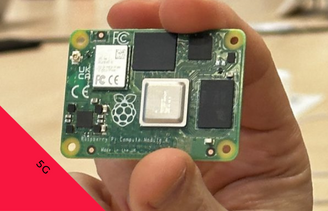The UK Government is committed to diversifying the telecoms supply chain, but diversification can cover a multitude of principles, and different players in the ecosystem will have varying viewpoints on what diversification means for them. As a part of our new content series, Perspectives on Diversification, UKTIN spoke to Wyn Meredith, Director of the Compound Semiconductor Centre and Rob Harper, Programme Manager for Power and RF Technologies.

1/ How do you define diversification?
Harper: Looking at the upcoming 6G device requirements, a multitude of different technologies including opto and wireless will be needed. Diversification is crucial, since each device technology needs a separate, robust supply chain. At the moment, in the UK we have significant gaps in our critical supply chains. This is especially true on the RF side.
Meredith: It’s a very simple message from us. We are a part of a Cluster of research, innovation and manufacturing activity in Wales that is focused on the semiconductor materials and devices. We sit at the bottom of the supply chain and respond to the device requirements from the system vendors. The Cluster has an industrial output of in excess of £500M per annum in semiconductor materials, devices and capital equipment; 97% is export, and it supports about 2400 high value jobs. We give the UK a strategic play in a global environment where countries such as the US, EU and China have recognised the importance of semiconductor manufacturing and are investing Billions to strengthen supply chains. We define diversification as engagement across the whole Telecom system supply chain - from ‘atoms to applications’. We’re getting involved because it will give us access to new UK innovation and opportunities in future Telecoms hardware solutions, and we offer the UK Telecoms ecosystem a valuable differentiator.
2/ How significant do you think supply chain diversification is and why?
Harper: It is certainly significant for Wireless. If you look at GaN RF devices, the International Traffic in Arms Regulations (ITAR) causes issues for UK systems companies. The United States government regulations that control the export and import of a specific list of defence-related munitions and services prohibits the big US companies supplying high performance RF devices to anybody in the UK. Without having an RF device manufacturing capability in the UK, we are majorly disadvantaged. People are frustrated that they can’t get the parts they need to make their systems competitive. If you look at defence and space, companies are currently having devices manufactured in Taiwan, which potentially presents a national security risk.
Meredith: Telecoms system hardware supply chains are really complex, operate globally and have huge value leverage. I don't think we should seriously consider that the UK is going to be able to onshore everything that is required. However, we have established areas that we can build on, compound semiconductors being an example. Engagement in a diversified UK ecosystem will give us visibility of what’s coming over the horizon, and provide understanding of the gaps and critical areas in future supply chains.
3/ What implications will it have?
Harper: The supply chains are pretty complex so we stay focused on development of the enabling device technologies Ultimately, what that does is provide designers with freedom to innovate and have their devices built in the UK without restriction. I think it will be very enabling.
Meredith: We are also interested in understanding how the implications of future telecoms systems impact semiconductor device manufacturing equipment and techniques. Our goal is to be a flexible, innovative partner in the ecosystem that the UK diversification programme is building, offering a viable route to scale up for UK-based manufacturing of semiconductor components.
4/ What are the key challenges in diversification?
Meredith: Well, I certainly think that one of the key challenges is creating a holistic ecosystem that can actually deliver commercially viable solutions derived from UK academic research. We need to work out our existing strengths and weaknesses and mitigate the gaps. In addition to this, there are very specific technical advantages of open access networks and interoperability, but there are commercial challenges in creating a competitive marketplace. Longevity is also something to bear in mind; it’s going to take time to build capability, so we need to be committed to a long-term strategy, this is not about quick wins. It’s really important for us to engage with emerging 6G concepts now, so that we are ready when the market matures.
Harper: Another challenge is device manufacturing, moving to new materials and device architectures, for example. When dealing with next generation materials such as diamond and Gallium Oxide we have to anticipate problems.How do we overcome these challenges?
5/ How do we overcome these challenges?
Meredith: I think we need to consider how we give support, not only to applied research, but to activities aimed at scaling up the production of new technologies. A clear plan is required to deliver the future workforce skills that will allow the UK to capitalise on the opportunities that diversification will present. We also need to contemplate how future telecoms business models will evolve- sometimes the technology is ready, but it's the market that isn’t.
Harper: We are fortunate that we have strong complementary capabilities with the universities and within the regional cluster. We have very competent partners, which always helps.









